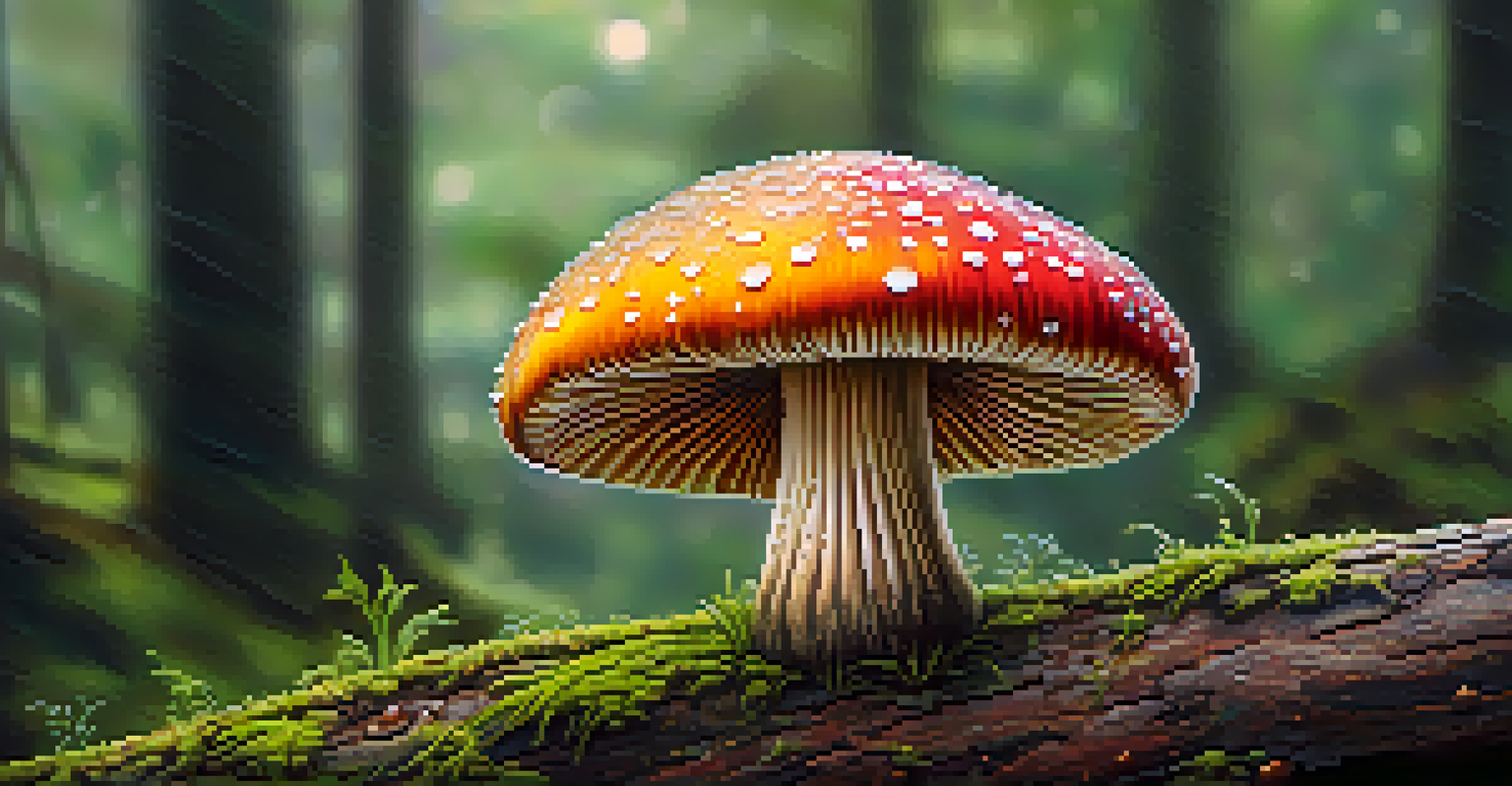The Role of Hallucinogens in Shaping Human Consciousness

Understanding Hallucinogens: A Brief Overview
Hallucinogens are substances that can alter perception, mood, and cognitive processes. These include naturally occurring compounds like psilocybin found in mushrooms and synthetic drugs like LSD. Their primary characteristic is the ability to induce altered states of consciousness, which can lead to profound personal insights or mystical experiences.
Psychedelics are a tool for self-exploration and healing, offering profound insights into the nature of consciousness.
Historically, many cultures have utilized hallucinogens in spiritual and religious practices, believing they can connect users with higher realms or deeper truths. For instance, indigenous tribes in the Amazon have long used ayahuasca in ceremonial settings to facilitate healing and enlightenment. This cultural backdrop sheds light on the longstanding relationship between humans and these powerful substances.
In recent years, there has been a resurgence of interest in hallucinogens, especially in the realms of psychology and psychiatry. Researchers are exploring their potential therapeutic benefits, particularly for conditions like PTSD, depression, and anxiety. This renewed focus highlights the complex role these substances play in both historical and modern contexts.
The Neuroscience Behind Hallucinogens
When hallucinogens are ingested, they interact with the brain's neurotransmitter systems, particularly serotonin receptors. This interaction can lead to enhanced sensory perception and altered thought patterns. The brain's default mode network, responsible for self-referential thinking, often shows reduced activity under the influence of these substances.

This reduction in default mode network activity can result in a sense of ego dissolution, where users feel a loss of their personal identity. Many report experiencing interconnectedness with the universe or feeling as though they are part of something greater. Such experiences can be transformative, often leading to lasting changes in perspective and behavior.
Therapeutic Benefits of Hallucinogens
Recent studies indicate that hallucinogens like psilocybin can significantly improve mental health conditions such as depression and PTSD.
Furthermore, the neuroscience behind these experiences is still being studied, but initial findings suggest that hallucinogens might promote neuroplasticity—the brain's ability to reorganize itself. This could explain why some users report long-term benefits, such as increased creativity and enhanced emotional resilience, following a single experience.
Cultural Uses of Hallucinogens Through History
Throughout history, various cultures have integrated hallucinogens into their social and spiritual practices. For example, the use of peyote in Native American rituals serves not only as a sacrament but also as a means of community bonding. These practices highlight the communal aspects of hallucinogenic experiences, often emphasizing shared journeys toward enlightenment.
The mind is like a parachute. It doesn’t work if it is not open.
In ancient civilizations, such as the Aztecs and Mayans, hallucinogens were revered not just for their psychoactive effects but for their roles in facilitating communication with deities. Festivals and rituals often involved these substances, blurring the lines between the sacred and the everyday. This use underscores the belief that hallucinogens can act as conduits to deeper understanding.
Modern societies are beginning to revisit these ancient practices, recognizing the potential for hallucinogens to foster personal and communal healing. As we uncover the wisdom of past cultures, we may find valuable lessons in how to responsibly integrate these substances into contemporary life.
The Therapeutic Potential of Hallucinogens
Recent studies have shown promising results for the therapeutic use of hallucinogens in treating mental health disorders. For instance, psilocybin therapy has demonstrated significant benefits for patients suffering from depression, often leading to rapid improvements in mood and outlook. These findings have sparked a growing interest in the medical community regarding the potential for psychedelics in therapy.
The therapeutic setting is crucial, as the environment and guidance provided during a hallucinogenic experience can greatly influence outcomes. Trained therapists often accompany patients, helping them navigate the emotional and psychological landscapes they encounter. This support can lead to a safe and meaningful exploration of their thoughts and feelings.
Cultural Significance of Hallucinogens
Historically, various cultures have utilized hallucinogens in spiritual practices, emphasizing their role in personal and communal healing.
Moreover, the results of these studies suggest that hallucinogens could promote long-lasting changes in how individuals process trauma and emotional distress. By facilitating a deeper understanding of their experiences, users may emerge with renewed hope and coping strategies, making hallucinogens a powerful tool in mental health treatment.
Hallucinogens and Spiritual Experiences
Many users of hallucinogens report profound spiritual experiences, often describing feelings of unity, transcendence, and deep insights into the nature of existence. These experiences can leave lasting impressions, shaping an individual’s beliefs and worldview. For some, the insights gained during these journeys catalyze a spiritual awakening.
The sense of interconnectedness often reported during hallucinogenic experiences resonates with various spiritual traditions, which speak of oneness with the universe. This connection can lead to a reevaluation of personal values and priorities, encouraging individuals to live more authentically. The transformative potential of these experiences is a key reason many seek out hallucinogens for spiritual exploration.
Additionally, the therapeutic benefits of hallucinogens often intersect with spiritual exploration. Users may find that their experiences not only alleviate psychological distress but also enhance their spiritual lives. This dual benefit illustrates the complexity of hallucinogens, serving as tools for both healing and profound self-discovery.
Risks and Ethical Considerations
While hallucinogens hold promise, they also come with risks that must be acknowledged. Not everyone reacts positively to these substances; some may experience anxiety, paranoia, or confusion during their trips. Understanding individual susceptibility is crucial, and responsible use should always be emphasized to minimize potential harm.
Ethical considerations also arise in the context of therapeutic settings. With the resurgence of interest in psychedelics, it’s essential to ensure that these substances are used safely and responsibly. This includes providing adequate support and guidance to users, as well as respecting the cultural significance of these substances in indigenous practices.
Risks and Ethical Considerations
While hallucinogens offer potential benefits, it is crucial to acknowledge the associated risks and ensure responsible use in therapeutic settings.
Moreover, as research continues to unfold, it is vital to address societal perceptions and legal frameworks surrounding hallucinogens. Advocating for informed and compassionate approaches to their use can help pave the way for broader acceptance and understanding, ensuring that the potential benefits are harnessed responsibly.
The Future of Hallucinogens in Society
As we continue to explore the role of hallucinogens in shaping human consciousness, the future looks promising. With ongoing research and changing perceptions, there is potential for these substances to be integrated into various fields, from mental health care to personal development. This evolution may ultimately redefine our understanding of consciousness itself.
Public interest in hallucinogens is growing, fueled by anecdotal success stories and scientific research alike. As more studies emerge, we may see shifts in policies that allow for regulated use in therapeutic contexts. This could lead to a new era of mental health treatment, one that embraces holistic and innovative approaches.

Ultimately, the conversation around hallucinogens is not just about the substances themselves, but about how they can enrich our understanding of the human experience. As society becomes more open to exploring these dimensions of consciousness, we may uncover new pathways to healing, connection, and personal growth.